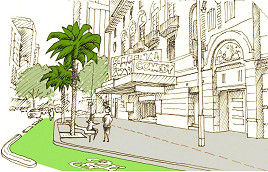Community weighs in on future of CBD living
The first phase of community engagement for the future of Melbourne’s CBD is now complete, with the City of Melbourne (CoM) now considering feedback on how it can make the city an even better place live. But community leaders say there is still a long list of challenges that need to be addressed to improve liveability.
Running from October 18 to December 16 last year, hundreds of locals had their say on the council’s services and facilities, as well as issues including safety and neighbourhood connections through the Participate 3000 initiative.
The feedback will inform the CoM’s CBD Neighbourhood Plan, one of 11 such neighbourhood plans, alongside plans for Carlton, Kensington, North Melbourne, West Melbourne, East Melbourne, Parkville, Docklands, Southbank, South Yarra and Fishermans Bend.
Lord Mayor Sally Capp said the voices of the community had always been integral to the way that the council worked, as it delivered services and planned for the city’s future.
“In an effort to become even more inclusive and responsive, we’re connecting with our communities on a neighbourhood level – we’re eager to better understand their needs and ideas,” she said.
But asked about the feedback received so far and what people envisaged for the future of Melbourne, EastEnders president Stan Capp (no relation) said there was still a long list of challenges.
“There will be several reasons why people moved to the city that are now being challenged,” he told CBD News.
“The arts/theatre [precinct] has certainly taken a hit but most will hopefully remain and re-surface stronger over time.”
“Access to work for some will have been a reason and this has been turned on its head with working from home.”
While nice views, sunlight and good amenity were “big” reasons for moving to the city in years gone by, Mr Capp said the proliferation of high-rise apartments or commercial premises with “little to no regard” for existing residents, and the loss of amenity had been profound.
“This is a pre-COVID phenomenon and coming out of COVID it will remain a problem,” he said.
“Similarly, drug trafficking, users, homelessness and anti-social behaviour is likely to continue post-COVID notwithstanding some useful initiatives that have been implemented. More needs to be done.”
Asked what people were envisaging for the future of Melbourne, Residents 3000 vice president Artur Hajda said that inner city locals did not want to be treated any differently than any other communities across Australia.
“Yes, a higher percentage of us live in tall towers and we sometimes encounter particular issues that may be uncommon for residents from the suburbs, but in the end the city is where our home is,” he said.
“And more and more people make the city their home.”
Post pandemic, Mr Capp said it was unlikely that office workers would return to the pre-COVID numbers as business realised staff could be productive working from home with hybrid arrangements anticipated.
With staff spending 50 per cent of their time at home, this would have a major effect on demand for office space and a re-configuration of commercial premises would be “inevitable”, he said.
“An emphasis in building a night time, alcohol-fuelled economy may bring short-term visitors but will not do much for residents and I predict that will mean a re-consideration of domicile for some,” he said.
“Most people I know who live in the CBD are very fond of Melbourne and love its laneways, quirky shops, restaurants and access to our iconic arts facilities. These areas need support post-COVID.”
“While the City of Melbourne adapts to these likely changes, the integrity of the city needs to be retained.”
The second phase of engagement for Participate 3000 will begin in March. The CBD Neighbourhood plan will be finalised in mid-2022 and Pade available via the Participate Melbourne website •
For more information: participate.melbourne.vic.gov.au/participate-3000

Council endorses office tower at Flinders Lane despite querying car park demolition






 Download the Latest Edition
Download the Latest Edition